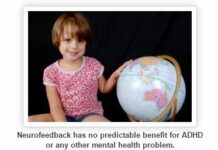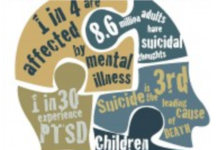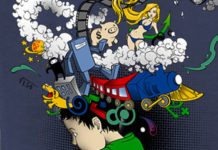“I am 16 and the Education System is Destroying my Health”
“This is an article about how our education system is ruining young people’s lives. Nobody is listening to the teachers who say it, so perhaps someone will listen to me,” sixteen-year-old Orli writes in the Guardian. “Nothing is so important that it’s worth risking your health over, not even the piece of paper you get, age 16, to tell you whether or not you’re good enough.”
Child Poverty Linked to Early Neurological Impairment
A new NIH-funded study suggests that children from low-income environments are more likely to have neurological impairments. The researchers claim that these neurodevelopmental issues are “distinct from the risk of cognitive and emotional delays known to accompany early-life poverty.”
The Legal and Moral Issues of Drugging Children
Jim Gottstein’s presentation March 29, 2012 at the APA’s Humanistic Division. Mr. Gottstein talks about the the legal and moral issues of the massive number...
Violence, Depression in Parents Linked to Kids’ ADHD, Depression
A prospective study of 2,422 children from 2004 to 2012 found that children whose parents reported Intimate Partner Violence (IPV) and depressive symptoms were...
Nevada Legislation Aims to Curb Psychotropics in Foster Children
A touching article in the Las Vegas Sun follows one child from abandonment through foster placements, polypharmacy, suicidality, delinquency and homelessness to stability off...
“Are Doctors Diagnosing Too Many Kids With ADHD?”
Salon.com points out that "While data point to at least some over diagnosis (of ADHD), at least in boys, the extent of this problem...
“Neurofeedback and ADHD”
The Mental Health Review blog discusses several studies comparing neurofeedback to placebo for ‘ADHD.’ “Many parents are being told that neurofeedback will ‘cure’ ‘ADHD’...
In-school Exercise a Help for Attention Deficits
Researcher Michele Tine of Dartmouth College’s Poverty and Learning Lab reports in the journal Frontiers in Psychology that 12 minutes of aerobic exercise caused...
“ADHD Does Not Exist”
The New Republic assays into the the ripe fields of debate over the ADHD diagnosis.
Article →
“The Myth of the Ever-More-Fragile College Student”
“The point, overall, is that given the dizzying array of possible factors at work here, it’s much too pat a story to say that kids are getting more 'fragile' as a result of some cultural bugaboo,” Jesse Singal writes in response to the flurry of recent think pieces decrying the weakened resolve of today's college students.
“Attention Deficit After Kids’ Critical Illness Linked to Medical Tubes”
Past research has revealed the children who get hospitalized in the intensive care unit are more likely to develop the symptoms associated with ADHD....
Association Between ADHD and Bipolar Disorder
Researchers in London review the literature on attention deficit hyperactivity disorder (ADHD) and bipolar disorder (BD), finding that "comorbidity and family studies appear to...
Air Pollution Linked to Mental Health Problems in Children
A new study, published in BMJ Open-Access this week, found a significant link between the level of air pollution in a community and the mental health of the children living there. After controlling for socio-economic status and other potential variables, researchers in Sweden discovered a strong association between the concentration of air pollution in a neighborhood and the amount of ‘antipsychotic’ and psychiatric drugs prescribed to children. The link remained strong even at pollution levels well below half of what is considered acceptable by the World Health Organization (WHO).
Study Finds Parents Need More Support to Identify PTSD in Children
A new study, published in The Journal of Clinical Psychiatry, investigates the presence of posttraumatic stress symptomatology in children involved in motor vehicle collisions...
Researchers Discover How Plastic Contaminants Cause Brain Changes and Hyperactivity
Researchers believe they have found "the smoking gun" that links common contaminants leaching from plastics to "adverse brain development and hyperactivity."
What If We Are All Wrong About Mental Illness?
From Thoughtful Living: The biomedical model of psychiatry, along with the DSM, is deeply flawed and can often be misleading. To improve, mental health services...
Germany Rejects New ADHD Drug
Finding that Shire's study of its successor to Adderall XR, Vyvanse, (lisdexamfetamine; known in Germany as Elvanse) was too short and did not look at the drug...
“Why are More Children Being Prescribed Antidepressants? Funding Cuts”
Eleanor Morgan writes in the Guardian opinions that the long waiting times for talk therapy and the increasing use of drugs in the UK...
Poor Evidence and Substantial Bias in Ritalin Studies
The authors of a large scale well-conducted systematic review of methylphenidate, also known as Ritalin, conclude that there is a lack of quality evidence for the drug’s effectiveness. Their research also revealed that Ritalin can cause sleep problems and decreased appetite in children.
Growing Evidence for the Link Between ADHD Diagnosis and Age at School Admission
Researchers detect a striking relationship between the month of school enrollment relative to peers and patterns of ADHD diagnoses in a large sample of elementary school students throughout the US.
“ADHD: A Return to Psychology” Video Series
Most people believe that children diagnosed with ADHD misbehave because they possess an inferior inhibitory system that renders them less able to suppress unacceptable actions. However, this belief has numerous shortcomings. This series of videos challenges these assumptions and offers alternative explanations for why a child may exhibit ADHD behaviors.
Researchers Question the Utility of an ADHD Diagnosis
A new article examines the usefulness of the ADHD diagnosis and suggests alternatives
“CDC Warns that Americans May be Overmedicating Youngest Children with ADHD”
The Centers for Disease Control and Prevention (CDC) released new data indicating that as many as 75% of young children who are diagnosed with...
“The Life and Times of Strider Wolf”
In the Boston Globe, Sarah Schweitzer tells the story of a young boy brutally abused by his parents then given to his grandparents who struggled with extreme poverty and homelessness. “Researchers now understood that trauma could alter the chemistry of developing brains and disrupt the systems that help a person handle stress, propelling a perpetual state of high alert. The consequences could be lifelong. As an adult, he’d be more likely to suffer anxiety and depression and heart disease and stroke. His ability to hold a job, manage money, and make good decisions could be compromised. And there was evidence, controversial but mounting, that he could pass on these traits to his children.”
“Generation Meds: the US Children Who Grow Up on Prescription Drugs”
“In America, medication is becoming almost as much a staple of childhood as Disney and McDonald’s,” writes Sarah Boseley in the Guardian. In this piece photographer Baptiste Lignel follows six boys and girls to examine the long-term effects of these drugs.















